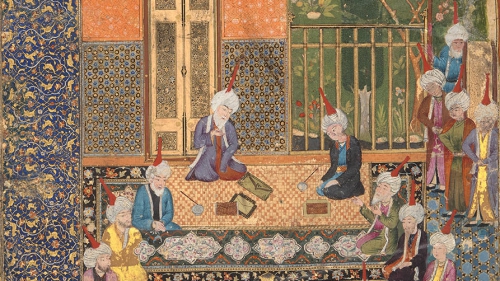Authentic Sufism

There are two types of Sufism: authentic and pseudo, or theosophical, Sufism. Authentic Sufism is a product of Islam alone, and hence must be studied primarily against the backdrop of the Islamic message as a criterion and standard. It is because of this, essentially, that we have earlier rejected the notion of equating Sufism with mysticism, the latter being a product of some alien-to-Islam cultures, worldviews and traditions, especially those of Christianity. Sufism is never to be interpreted as Islamic mysticism, or mysticism in Islam, thus doing immense injustice to both Islam and Sufism. In English, Sufism is to be termed just like that, "Sufism" (from Tasawwuf in Arabic) and its people "Sufis" (from Sufiyyah in Arabic).
There are many definitions of authentic Sufism. Most of them revolve around the concepts of inclusive sincerity in faith and worshipping Allah, whereby the truth of divine love and knowledge through direct personal experience of Allah, is sought. Sufism is also synonymous with rigid introspection, mental struggle, purification of baser self, purity of intentions and acts, trust in God, approach to God through love and voluntary suffering resulting from ascetic ways of life and rigorous obligatory and voluntary worship.
The following two traditions (hadith) of the Prophet (pbuh) are often cited as the best description of the true Sufi path.
Firstly, a companion Abu Hurayrah narrated that Allah's Messenger (pbuh) had said: "Allah said: 'I will declare war against him who shows hostility to a pious worshipper of Mine. And the most beloved things with which My slave comes nearer to Me, is what I have enjoined upon him; and My slave keeps on coming closer to Me through performing nawafil (praying or doing extra deeds besides what is obligatory) till I love him. And when I love him, I become his sense of hearing with which he hears, and his sense of sight with which he sees, and his hand with which he grips, and his leg with which he walks; and if he asks Me, I will give him, and if he asks My protection (refuge), I will protect him; (i.e., give him My refuge) and I do not hesitate to do anything as I hesitate to take the soul of the believer, for he hates death, and I hate to disappoint him." (Sahih al-Bukhari)
Secondly, Abu Hurayrah also narrated that Allah's Messenger (pbuh) had said: "Allah said: 'I am just as My slave thinks I am, (i.e., I am able to do for him what he thinks I can do for him) and I am with him if He remembers Me. If he remembers Me in himself, I too, remember him in Myself; and if he remembers Me in a group of people, I remember him in a group that is better than they; and if he comes one span nearer to Me, I go one cubit nearer to him; and if he comes one cubit nearer to Me, I go a distance of two outstretched arms nearer to him; and if he comes to Me walking, I go to him running." (Sahih al-Bukhari)
The "union" between God and man implied in the abovementioned hadiths is a union representative of a single will, purpose and objective, which is devoid of any ingredients of anthropomorphism and divinization alike, and of any other unorthodox connotations and judgments. It is the only type of union that Islam recognizes. It is the only union that authentic Sufism espoused.
Authentic Sufism is nothing else but the quintessence of orthodox Islam. It signifies practicing Islam in the most excellent way. It is the final and most accomplished phase in a believer's spiritual development. It is the final phase, a culmination, which emphasizes the inner dimensions of worship more than anything else, but which must be founded upon, and saturated with, Islamic genuine faith and submission. The former is conditioned by the latter, in that it is a general tenet in Islam that no action is good enough and acceptable unless done sincerely in the name of God and according to the precepts of the Islamic Shari'ah (Law). For some, therefore, Sufism simply means "interiorization of Islam".
Hence, many Sufi authorities were always quick to point out that any conflict between Sufism and the main body of Islamic beliefs, principles and values is intolerable. For example, Ahmad al-Rifa'i (d. 578 AH/ 1182 CE), whose life example served as the foundation for the modern Rifai Sufi Order, is reported to have said: "Every Sufi order which is at odds with the Shari'ah is a form of heresy."
Also, Abu Yazid al-Bistami (d. 261 AH/ 875 CE), one of the early Sufi masters, said that if a person performed such great miracles (karamat) as ascending the sky, people should not be fooled into believing him until they made certain that his relationship with the Shari'ah was right. Otherwise, such would be but Satan's swindle.
Fully concurring with their fair-minded Sufi counterparts, and so, displaying a strong sense of spiritual and intellectual unity as well as reciprocal respect, various mainstream Muslim scholars too hastened to approve the subject matter from their own point of view. Thus, for example, Layth b. Sa'd (d. 175 AH/ 791 CE), a leading scholar of his time, is reported to have said that if people saw a man walking on water, or flying in the air, as a demonstration of his miraculous power, they should not be hoodwinked into believing him until they measured his whole case against the Qur'an and Sunnah. Other scholars, both his contemporaries and those who came after him, followed in the footsteps of Layth b. Sa'd endorsing the same pattern.
Once the Prophet (pbuh) explicitly referred to the spiritual progression and growth from outward submission (islam) common to all Muslims, to faith (iman) where a person becomes a believer (mu'min), and finally to ihsan, a stage where the unseen becomes as if seen (Sahih al-Bukhari) - and that is exactly what authentic Sufism stands for and tries to accomplish.
Commenting on this Prophet's hadith, in a context of explaining the meaning of Islam and its spiritual stations through which a person must pass in order to attain spiritual perfection, Shahrastani in an introduction to his book "The Book of Sects and Creeds" (Kitab al-Milal wa al-Nihal) wrote: "Since islam in the sense of outward submission is something common to all, this is the beginning. If it is accompanied by sincerity, and if one believes in God, His angels, His scriptures, His messengers and the Last Day; and if he also believes and affirms that all good and evil are determined by God... such a one is a true believer, mu'min. Thus when submission and faith are brought together, and outward effort is united with inner vision so that the unseen becomes (as if) the seen, the final stage is reached. Thus, islam is the beginning, iman the intermediate stage and ihsan the final stage." In effect, the concepts of ihsan, ikhlas (purity of actions), and true Sufism are nigh on indistinguishable. For Seyyed Hossein Nasr, the concept of ihsan, which he also translates as virtue or the beauty of the soul, is the goal of Sufism and throughout the centuries those who have followed that path have tried to cultivate ihsan.
The furthermost spiritual goals of Sufism, by and large, are illumination or enlightenment, finding the truth of, and receiving, divine love, and acquiring interior spiritual knowledge, or gnosis, via divine inspirations, or unveilings, which God grants certain persons by special grace. In order to achieve those goals, the Sufis set out on a spiritual journey typified by strict ascetic practices and observing certain formulas and modi operandi for meditation, worship and remembrance of God. The journey is a difficult one through which a Sufi progresses by means of his own mujahadah (work or self-mortification). The seeker or disciple (murid) also needs a master (shaykh) who educates and guides him for a successful completion of the journey. While on the journey, a disciple dwells in a number of spiritual stations (maqam), which are described in varying sequence. Their number is not uniform among all Sufis, but the majority agrees on seven major stations. In each maqam the Sufi strives to purify himself from all worldly inclinations and to prepare himself to attain an ever-higher spiritual level. During his spiritual journey towards God, a Sufi also lives through spiritual states of mind (hal) that come to the Sufis from time to time. The Sufis spoke of hundreds of states or ahwal, plural of hal. The ahwal are graces of God that cannot be acquired or retained through an individual's own efforts. When the soul is purified of its attachments to the material world, it can only wait patiently for those spiritual gifts of God. This whole Sufi order with its organizational structure and hierarchy, as well as its curricula and trainings, is called tariqah, meaning "way" or "path". However, regardless of which maqam or hal the Sufis were in, or which tariqah they belonged to, for all true Sufis strict compliance with the requirements of the Shari'ah and imitation of the Prophet's exemplary lifestyle, are basic.
Many other Islamic principles and values were adopted by the Sufis and were duly applied, often exceedingly, and were translated into either maqams (stations) or hals (states). Some of those principles and values are: trust in Allah (tawakkul), abstinence (zuhd), unconditional love of Allah and the Prophet (pbuh) (hubb Allah wa al-Rasul), humility (tawadu'), God-consciousness (taqwa), fear and hope (khawf and raja), generosity (sakha'), vigilance (muraqabah), physical, intellectual and spiritual exertion (jihad), contentment (qana'ah), patience (sabr), satisfaction (rida), gratitude (shukr), "nearness" to Allah (qurb), "intimacy" with Allah (wudd), and many others.
Because authentic Sufism was identifiable with the Islamic orthodox spirituality, mapping out the exact origins of the movement was always in terms of the origins of the Islamic tradition. It is thus always said that the origins of Sufism are the Qur'an, the Sunnah (lifestyle) of the Prophet (pbuh), and the most excellent practices of the first three generations of Muslims called Prophet's companions (sahabah), their followers (tabi'un) and then the latter's followers (atba' tabi'in). This is in accordance with the Prophet's declaration: "The best people are those living in my generation, then those coming after them, and then those coming after (the second generation)" (Sahih al-Bukhari) Hence, there was no Sufism as such during the first two centuries of Islamic civilization. There were only pious circles which were formed as a reaction against the excessive worldliness of some Muslim rulers, aristocrats and the Muslim masses. Those people were known for their meticulous application of the Qur'anic injunctions and those found in the Prophet's Sunnah, for observing numerous voluntary acts of worship especially fast and night prayers, for their austere living, and for their constant reading of and meditating on the Qur'an, especially on those verses which talk about the trials and tribulations associated with the Day of Judgment. Those exceptionally pious people were generally called "ascetics" (zuhhad), "worshippers " ('ubbad) and "devout men" (nussak). As the time was passing, however, and the overall situation in Islamic society deteriorated to the point where even the concepts of "ascetics" (zuhhad), "worshippers " ('ubbad) and "devout men" (nussak) were manipulated and abused by several religious sects and political parties, which kept cropping up on the Muslim religious, epistemological and political scenes, a number of true ascetics, worshippers and hermits from the mainstream of the ahl al-Sunnah wa al-jama'ah (adherents to the Sunnah and the community) spontaneously commenced to organize themselves in a loose movement which people gradually started calling Sufism (tasawwuf) and its adherents Sufis (sufiyyah). Their sole goal was to fully adhere to and thus preserve the Prophet's model and the model of the early exemplary Muslim generations.
Ibn Taymiyah (d. 729 AH/ 1328 CE), a fierce critic of Sufism, looked upon the emergence of Sufism as a natural consequence of the rapid developments and changes that early Islamic society was undergoing. It was a phenomenon which was neither completely good, because the Prophet (pbuh) and the early generations of Muslims were not Sufis and did not observe much of what became symbolic of the Sufi doctrines and practices, nor completely bad, because Sufism, after all, originated in the Islamic midst and its proponents were Muslims. Just like any other novel trend and development in Islamic society, Sufism too had to be juxtaposed with the primary sources of Islam, the Qur'an and Sunnah, as well as with the life patterns of the first Muslims who fully adhered to such sources. Only then can it be known what is acceptable and what is unacceptable.
About the original and authentic form of Sufism, which preceded what Ibn Taymiyah dubbed as "Sufism diversification and braking up" into several groups one of which was unmistakably deviational, Ibn Taymiyah wrote that just as many Sufi contemporaries strove (ijtihad) and sought the deep truth pertaining to numerous issues and challenges in the spheres of jurisprudence, theology, judiciary and political affairs, so were the Sufis mujtahids striving and seeking the deep truth in relation to obedience (ta'ah) of Allah. And just like all mujtahids, Sufi mujtahids too were sometimes right and sometimes wrong. In matters in which they erred, the only solution for them and their followers - as is for everyone else who goes astray in a religious matter -- was to return to the essence of the Islamic message as enshrined in the Qur'an, Sunnah, and the practices of the first Muslims. Moreover, the Sufis, just like all Muslims, could generally be classified into those who are foremost in good deeds, those who follow a middle course, and those who wrong their own souls. It is always that the best among them all are those who possess most taqwa, i.e., those who are most God-conscious.
In an apparent endorsement of authentic and conformist Sufism, Ibn Taymiyah did not hesitate to call their leading figures "sheikhs", "the people of erudition", and "the sheikhs of the Qur'an and the Prophet's Sunnah". Once while harshly criticizing a form of deviational theosophical Sufi thought and their adherents, Ibn Taymiyah mentioned, as the antithesis of the former, several names of the early Sufi masters who are central figures in the chains of many Sufi orders, including Ibrahim b. Adham (d. 161 AH/ 778 CE), Ma'ruf al-Karkhi (d. 200 AH / 815 CE), Fudayl b. 'Iyad (d. 187 AH/ 803 CE) and al-Junayd al-Baghdadi (d. 297 AH/ 910 CE). After mentioning their names, Ibn Taymiyah said about them: "May Allah be pleased with them all". He also called al-Junayd al-Baghdadi the master (sayyid) of the Sufi community and an imam of guidance.
Finally, when he referred to Abu Hamid al-Ghazzali and his illustrious work, "Ihya' 'Ulum al-Din" (The Revival of the Religious Science) -- who arguably represents the last great figure in the line of classical Sufism, and who wrote the mentioned book as a staunch defender of authentic Sufism against the growing threat of pseudo Sufism, just as many other Sufi masters had done before him - Ibn Taymiyah affirmed that al-Ghazzali's book contains a number of Sufi errors and lies. However, he also said that in it there are many things from the knowledgeable Sufi sheikhs, who were upright and steadfast in the deeds of the heart and in other worship and morality acts, what is in full harmony with the Qur'an and Sunnah.

Ibn Qayyim al-Jawziyyah (d. 751 AH/ 1350 CE), the closest student, disciple and successor of Ibn Taymiyah, just like his mentor, was known for his depth in the matters and intricacies of Sufism. He was critical of Sufi deviations and deceits as much as he was honest about, and supportive of, authentic Sufism. The contents of his book "Madarij al-Salikin" (The Pathways of the Travelers), which is a commentary of the great book on Sufism, "Manazil al-Sa'irin" (The Stations of the Seekers) by Abu Isma'il al-Hirawi al-Sufi (d. 481 AH/ 1088 CE), is a testimony to this. In the said book, Ibn Qayyim al-Jawziyyah quoted regularly Abdul Qadir al-Jilani (d. 561 AH/ 1166 CE), a famed Sufi master and traditional founder of the Qadiriyah Sufi order. At one point, he called him the sheikh, the gnostic ('arif) and the role-model (qudwah).
It would be rather inappropriate to say that one of the main reasons for which Sufism appeared on the Islamic scene was the Sufis' opposition to the dry casuistry or rule-based reasoning of jurists, and the dialectics and intellectualism of theologians and philosophers, which as a consequence led to the rigid formalism in religion to which the masses subscribed. As a reaction, Sufism promoted not so much a set of doctrines as it did a mode of spiritual thinking and feeling. As a matter of fact, many Sufis themselves, especially in the movement's formative phase, were renowned jurists, theologians, preachers, and the scholars of the Qur'an and the Prophet's Sunnah. A few Sufis even did not hesitate to step into politically sensitive legal position, though they did not participate in the making of politics as such. In accepting posts as judges, qadi pl. qudah, and muftis -- mufti is one who gives legal opinions -- they may have been motivated by their desire to uphold the Shari'ah (Sacred Law).
So, what happened -- even though the above possibility could be to some extent plausible -- was that the Sufis, primarily, wanted to carve out their own way of looking at, and experiencing, things, and thereby, together with all the other constructive forces in Islamic society, play an important role in the development of Islamic culture and civilization. It is true that they regarded the Sufi way as the best way, but never did they insist that the other Islamic "ways" were completely flawed. Indeed, the Sufis were as much prone to intermingling and socializing with the masses, giving and taking, as they were recluses and hermits, as the signs of their thorough devotion to spiritual work.
Hence, we often hear some Sufis insisting that helping and serving fellow Muslims are most virtuous deeds. Ma'ruf al-Karkhi is reported to have been advised by some Sufis that he should never give up action or work ('amal) for it is ever bound to bring him closer to the pleasure of Allah. When he asked what they meant by action or work, Ma'ruf al-Karkhi was told: "Continuously obeying Allah, and serving and advising other Muslims." It is no wonder, then, that many Sufis were known as preachers. Their sessions in mosques were attended by large numbers of people representing all walks of life.
Prior to the emergence of the Sufi institutions approximately in the 4th AH/ 10th CE century, most Sufis used the mosque institution, which functioned as a community center, as a platform for their multifaceted intellectual and spiritual engagements. They equally shared that platform with the other mosque clients, be they scholars, government employees or just the ordinary men and women. In this respect, there was no much to separate the Sufis from the other intellectual, social and religious categories in the community. The only thing which set the Sufis apart from the rest was their excessive ascetic living, ardent obligatory and voluntary worship, and excellent morals. Their public reputation was built around those premises. Thus, once a Sufi advised that a person should be a guest of the mosque every night. Abdullah al-Murta'ish (d. 329 AH/ 940 CE), a Sufi from Nishabur in Khorosan, is said to have resided in a mosque. Ibrahim b. Adham too, had a habit of sleeping in mosques. Ruwaym b. Ahmad (d. 303 AH/ 915 CE), a Sufi master from Baghdad who at the same time was a jurist, asked once during daytime for a glass of water from the residents of a house in Baghdad. A small girl with a cup in her hand opened the door, and upon seeing Ruwaym b. Ahmad, and upon recognizing him as a Sufi, she exclaimed: "How come that a Sufi drinks during daytime!" Such was the reputation of the Sufis that a small girl expected that they fast every day. Ruwaym b. Ahmad, however, took that as a reproach and a wakeup call. He said: "After that, I fasted every day."
Furthermore, the Sufis, more often than not, commanded great respect from the members of both the Muslim political elite and the mainstream intellectual leadership. Al-Ma'mun (d. 218 AH/ 833 CE), an Abbasid caliph, once admitted that there was nobody left in either Baghdad, the seat of the Abbasid caliphate, or in the entire Iraq region, he was shy with but a Sufi sheikh Bishr b. al-Harith (d. 227 AH/ 841 CE). Dhu al-Nun al-Misri (d. 243 AH/ 857 CE) is likewise said to have advised another Abbasid caliph, al-Mutawakkil (d. 247 AH/ 861 CE), after the latter had brought him from Egypt to Iraq. Dhu al-Nun al-Misri advised and admonished the caliph till he profusely cried. He then was sent back to Egypt greatly honored. Caliph al-Mutawakkil used to fondly and reverently remember Dhu al-Nun al-Misri ever since. As regards the mainstream intellectual leadership, there are reports that Imams Abu Hanifah (d. 150 AH/ 767 CE) and Ahmad b. Hanbal (d. 241 AH/855 CE) displayed much reverence for some early Sufi masters. Ahmad b. Hanbal is said to have once consulted a Sufi scholar, Abu Hamzah al-Bazzar (d. 289 AH/ 902 CE), about some religious themes. He was moved to tears when he on an occasion heard a Sufi theorist deliver a sermon on Sufism.
It was because of these qualities of authentic Sufism that Abu Mansur al-Baghdadi (d. 429 AH /1037 CE) in his authoritative book on sectarian divisions within Islamic society "Al-Farq bayn al-Firaq" (The Difference between the Sects) included the "Sufi ascetics" (al-zuhhad al-sufiyyah) as one of the eight groups of the ahl al-Sunnah wa al-jama'ah (adherents to the Sunnah and the community). And the ahl al-Sunnah wa al-jama'ah is the only "saved group" which the Prophet (pbuh) had in mind when he said that the Muslim community after him will split into seventy-three sects. Seventy-two of them will be in the Fire. Only one of them will be saved. For al-Maqrizi (d. 845 AH/ 1441 CE), the vanguard of the Sufi movement exemplified the finest of the ahl al-Sunnah wa al-jama'ah community. The similar words have been uttered by Abu al-Qasim al-Qushayri (d. 465 AH/1072 CE) as well.
Abdul Qadir al-Jilani (d. 561 AH/ 1166 CE) also stated while dwelling on the subject of Sufi categories within the Sufi path, that the Sufis are divided into two sections. Firstly, there are the followers of real Sufism, which is the Sufism of the ahl al-Sunnah wa al-jama'ah. They are the "Sunnis". As such, they belong to the "saved group" which the Prophet (pbuh) had in mind when he revealed that the Muslim community after him will split into seventy-three sects from which only one will be saved. The other group consists of heretics.
Dr. Spahic Omer, a Bosnian currently residing in Malaysia, is an Associate Professor at the Kulliyyah of Architecture and Environmental Design, International Islamic University Malaysia. He studied in Bosnia, Egypt and Malaysia. His research interests cover Islamic history, culture and civilization, as well as the history and philosophy of the Islamic built environment. He can be reached at spahico yahoo.com; his blog is at www.medinanet.org.
Topics: Sufism Values: Spirituality Channel: Opinion
Views: 12083
Related Suggestions





























